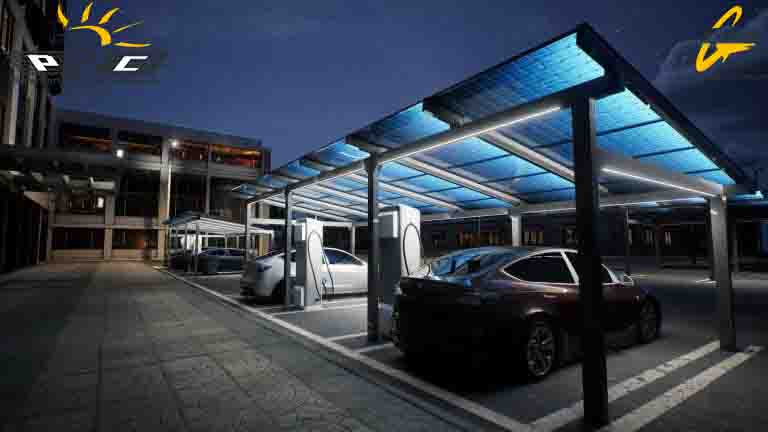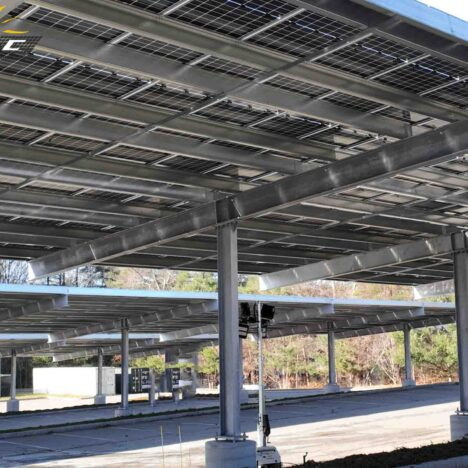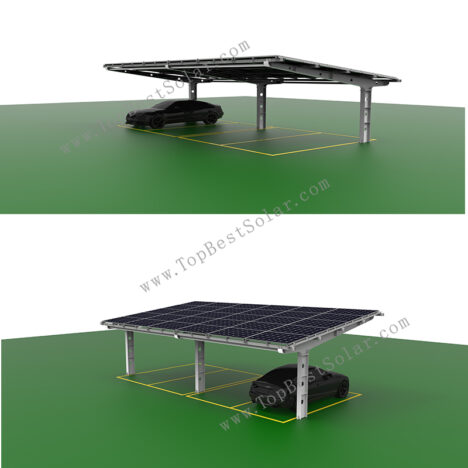
Solar Carports
As solar energy becomes increasingly accessible, homeowners and businesses are looking beyond rooftop panels. The solar carport has emerged as a powerful and efficient solution, turning underutilized parking space into a clean energy generator.
But is it the right investment for you? This guide provides a clear, unbiased look at the pros and cons of solar carports, the costs involved, and key factors to help you decide.
What is a Solar Carport?
A solar carport is a canopy structure designed to shelter vehicles, much like a standard carport. However, instead of a metal or polycarbonate roof, its surface is composed of photovoltaic (PV) panels. These panels convert sunlight into electricity, which can power your home, business, or electric vehicle.
It’s a brilliant piece of dual-purpose infrastructure: protecting your assets while producing energy.

The Advantages of Solar Carports
1. Optimal Use of Space
Solar carports make use of existing space—your driveway or parking lot—that would otherwise only serve a single purpose. This is ideal for properties with unsuitable roofs, shaded areas, or no available land for a ground-mounted system.
2. Perfect for Electric Vehicle (EV) Charging
Pairing a solar carport with an EV charger creates your own personal fueling station. You can charge your car with free, renewable energy from the sun, significantly reducing your transportation costs and carbon footprint.
3. Significant Financial Savings & Incentives
The electricity generated directly offsets your utility bill. Furthermore, you are likely eligible for major financial incentives.
4. Superior Vehicle Protection
Your cars are shielded from harsh UV rays, rain, hail, bird droppings, and falling debris. This preservation can maintain your vehicle’s resale value and save you money on repairs and detailing.
5. Increases Property Value
A permanent, energy-producing structure is an attractive asset. Studies have shown that homes with solar installations sell faster and for more money than those without.
The Disadvantages of Solar Carports
1. Higher Upfront Cost Than Rooftop Solar
This is the most significant barrier. Solar carports require a more robust structural framework and installation labor than traditional rooftop systems. This leads to a higher cost per watt installed.
2. Complex Installation and Planning
Installing a solar carport isn’t a simple DIY project. The process often involves:
-
Structural Engineering: Ensuring the design can withstand local wind and snow loads.
-
Permitting: Navigating building permits and electrical permits from your local government.
-
HOA Approval: If you live in a community with a Homeowners Association, you may need their approval.
3. Site-Specific Requirements
Not every location is ideal. To be effective, your proposed site must have:
-
Full Sun Exposure: Minimal shading from trees or buildings throughout the day.
-
Adequate Space: Enough room not just for the structure, but for vehicle access and maneuvering.

Solar Carport Cost Breakdown
So, how much is a solar carport? Costs vary widely based on size, materials, and location.
FAQ: Are Solar Carports Worth It?
Q: Can you put solar panels on a carport?
A: Yes, but it’s not as simple as retrofitting panels onto an existing metal carport. It requires a structure specifically engineered to handle the weight of the panels and meet electrical code requirements. Most opt for a purpose-built solar carport.
Q: What are the disadvantages of solar carports?
A: The main disadvantages are the high initial investment and the more complex installation process compared to rooftop solar.
Q: Should I get a solar carport in 2025?
A: If you have the upfront capital, suitable sun-exposed space, and a need for EV charging or high electricity consumption, a solar carport is an excellent investment in 2025.
Conclusion: Is a Solar Carport Right for You?
A solar carport is a compelling investment for those who want to maximize their renewable energy output, protect their vehicles, and future-proof their property for electric vehicles.
While the initial cost is higher than traditional solar options, the long-term savings, significant incentives, and added functionality make it a worthwhile consideration for many homeowners and businesses.
Your next step: Contact a few reputable solar installers in your area for quotes. They can assess your site, provide accurate cost estimates, and calculate your potential return on investment.
Follow us on Facebook to learn more about photovoltaic products.






